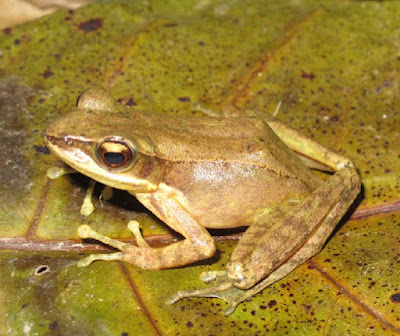 |
| Amolops truongi Pham, Pham, Ngo, Nenh, Ziegler & Le, 2023 RAFFLES BULLETIN OF ZOOLOGY. 71 Photo A. V. Pham. |
Abstract
A new species of Amolops is described from northwestern Vietnam based on morphological and molecular differences. Morphologically, the new species is distinguishable from its congeners on the basis of a combination of the following diagnostic characters: Snout–vent length 37.5–41.3 mm in males, 61.5–62.5 mm in females; head longer than wide; vomerine teeth present; snout long (ratio of distance from tip of snout to anterior corner of eye/ snout–vent length 0.16 in males, 0.15 in females); tympanum distinct, round (ratio of eye diameter/tympanum diameter 0.37–0.39 in males, 0.36–0.37 in females); skin smooth; supratympanic fold indistinct; dorsolateral fold present; webbing formula I0―1/2II0―1III0―1IV1―0V; in life, dorsum grey with indistinct greenish dots; head and body with irregular dorsolateral brown stripe; dorsal surface of forelimbs and hindlimbs bright grey with dark brown crossbars; throat, chest and belly white; vocal sac yellowish; external vocal sac present and finger I with nuptial pad in males. In phylogenetic analyses, the new species is recovered as a sister taxon to A. compotrix, but the two species are separated by 3.3–3.4% pairwise genetic divergence based on a fragment of the mitochondrial ND2 gene.
Key words. Amolops, Muong La District, ND2, new species, taxonomy
 |
| Amolops truongi, new species, in life. Dorsolateral view of the female paratype (ZVNU.2022.06) Photo A. V. Pham. |
Amolops truongi, new species
Diagnosis. The new species from Son La Province is assigned
to the Amolops monticola group on the basis of the following
morphological characters: dorsal skin smooth, lateral side of
head dark, with a light-coloured upper lip-stripe extending
to the shoulder, and dorsolateral folds distinct (Stuart
et al., 2010; Jiang et al., 2016). The new species is also
supported as a member of the A. monticola group based on
the molecular data (Fig. 2). Amolops truongi, new species,
is distinguishable from its congeners by a combination of
the following morphological characters: (1) SVL 37.5–41.3
mm in males, 61.5–62.5 mm in females; (2) head longer than
wide; (3) vomerine teeth present; (4) snout long (SE/SVL
0.16 in males, 0.15 in females); (5) tympanum distinct, round
(TD/ED 0.37–0.39 in males, 0.36–0.37 in females); (6) skin
smooth; (7) supratympanic fold indistinct; (8) dorsolateral
fold present; (9) webbing formula I0–1/2II0–1III0–1IV1–0V;
(10) in life, dorsum lightly grey with indistinct greenish
dots or greenish spots; (11) head and body with irregular
dorsolateral brown stripe; (12) dorsal surface of forelimbs
and hindlimbs light grey with brown crossbars, darker on
hindlimbs; (13) throat, chest and belly white; vocal sac
yellowish; (14) external vocal sac present and finger I with
nuptial pad in males.
Etymology. The species was named after the eminent
zoologist from the Institute of Ecology and Biological
Resources, Vietnam Academy of Science and Technology,
Prof. Dr. Truong Quang Nguyen, who has made tremendous
contributions to the study of Vietnam’s herpetofauna.
Distribution. Amolops truongi, new species, is currently
known only from the type locality in Muong La District,
Son La Province, Vietnam (Fig. 1).
Anh Van Pham, Cuong The Pham, Hanh Thi Ngo, Sung Ba Nenh, Thomas Ziegler and Minh Duc Le. 2023. A New Species of Amolops (Anura: Ranidae) from Son La Province, northwestern Vietnam. RAFFLES BULLETIN OF ZOOLOGY. 71; 51–69.